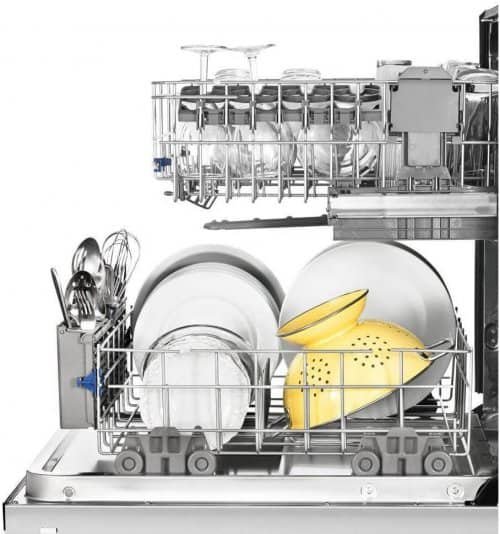Are you experiencing issues with your LG dishwasher? Don’t worry, we’ve got you covered! In this article, we will provide you with a comprehensive guide on troubleshooting common problems that you may encounter with your LG dishwasher. From basic tips to more advanced techniques, we’ll help you diagnose and resolve issues to get your dishwasher up and running smoothly again.
Table of Contents
Common LG Dishwasher Problems
- Dishwasher Not Starting
- Poor Cleaning Performance
- Leaking Dishwasher
- Noisy Operation
Dishwasher Not Starting
One of the most frustrating issues is when your LG dishwasher fails to start. Before jumping to conclusions, check if the dishwasher is properly plugged in and if the power supply is functioning. Additionally, ensure that the door is securely closed, as dishwashers have a safety mechanism that prevents operation if the door is not properly latched.
Poor Cleaning Performance
If your LG dishwasher isn’t cleaning your dishes effectively, there are a few things you can troubleshoot. Start by checking if the spray arms are clogged or obstructed. Clean them thoroughly and ensure that they can rotate freely. Additionally, make sure that you’re using the appropriate detergent and that the dishes are loaded correctly, allowing water and detergent to reach all areas.
Leaking Dishwasher
Water leakage can be a cause for concern, but it can often be resolved with some troubleshooting. Inspect the door seal for any damage or debris that may prevent a proper seal. Also, check the dishwasher’s tub and hoses for any cracks or loose connections. Tightening the connections or replacing damaged parts can help prevent leaks.
Noisy Operation
Unusual noises coming from your LG dishwasher can be bothersome. First, check for any loose items, such as utensils or small dishes, that may be causing the noise. If the noise persists, it could indicate a faulty motor or pump. In such cases, it’s best to contact a professional technician for further assistance.
LG Dishwasher Troubleshooting Tips
- Check Power Supply
- Ensure Proper Loading
- Check Water Supply
- Clean Filters and Spray Arms
- Inspect the Door Seal
Check Power Supply
Before troubleshooting any issues, verify that the dishwasher is properly connected to a power source. Ensure that the power cord is securely plugged into an outlet and that there is power supply to the outlet. If necessary, try plugging in another appliance to confirm if the outlet is functioning correctly.
Ensure Proper Loading
Proper loading of dishes is essential for optimal cleaning performance. Avoid overloading the dishwasher, as it can obstruct the spray arms and prevent water from reaching all the dishes. Also, make sure that the dishes are placed correctly, with no obstructions that may interfere with the spray arms’ rotation.
Check Water Supply
Inspect the water supply valve to ensure it is fully open and allowing water to flow into the dishwasher. If the valve is partially closed or blocked, it can affect the dishwasher’s performance. Additionally, check the water inlet hose for any kinks or obstructions that may restrict water flow.
Clean Filters and Spray Arms
Clogged filters and spray arms can lead to poor cleaning performance. Regularly clean the filters to remove any food particles or debris. Detach the spray arms and rinse them thoroughly to eliminate any blockages. A clean filter and unobstructed spray arms will ensure that water circulates efficiently during the cleaning cycle.
Inspect the Door Seal
A damaged or dirty door seal can result in leaks or ineffective cleaning. Carefully examine the door seal for any signs of wear, cracks, or debris. Clean the seal using a mild detergent and a soft cloth. If the seal is damaged, it should be replaced to prevent water leakage.
Advanced Troubleshooting
- Check the Drain Hose
- Inspect the Float Assembly
- Test the Heating Element
- Examine the Water Inlet Valve
Check the Drain Hose
If your LG dishwasher is not draining properly, it could be due to a clogged or improperly installed drain hose. Check the hose for any obstructions or kinks that may prevent proper water flow. If necessary, remove the hose and clean it thoroughly. Ensure that the hose is correctly installed and connected to the drain system.
Inspect the Float Assembly
The float assembly is a small device located at the bottom of the dishwasher. Its purpose is to monitor the water level inside the dishwasher. If the float is stuck or obstructed, it can interfere with the dishwasher’s operation. Gently move the float up and down to ensure it moves freely and isn’t obstructed by any debris.
Test the Heating Element
If your LG dishwasher is not drying dishes properly, the heating element might be the culprit. To test the heating element, run the dishwasher through a cycle and check if the dishes are hot and dry at the end. If not, the heating element may need to be replaced. Consult the dishwasher’s manual or contact a professional technician for assistance.
Examine the Water Inlet Valve
A faulty water inlet valve can result in inadequate water supply to the dishwasher. To check the valve, turn off the dishwasher and shut off the water supply. Disconnect the water inlet hose from the valve and inspect it for any debris or blockages. Clean or replace the valve if necessary.

LG Dishwasher Maintenance Tips for Optimal Performance
To keep your LG dishwasher running smoothly and efficiently, follow these maintenance tips:
- Regular Cleaning
- Run Hot Water Before Starting
- Use Recommended Detergent
- Keep the Dishwasher Level
- Avoid Overloading
Regular Cleaning
Periodically clean the interior of the dishwasher, including the tub, spray arms, and filters. Remove any food particles or debris to prevent clogs and ensure optimal cleaning performance.
Run Hot Water Before Starting
Before starting a dishwasher cycle, run hot water in your sink until it reaches its highest temperature. This helps ensure that the dishwasher starts with hot water, improving cleaning and sanitization.
Use Recommended Detergent
Always use the detergent recommended by LG for your dishwasher model. Using the wrong detergent can lead to poor cleaning results and may even damage the dishwasher.
Keep the Dishwasher Level
A properly leveled dishwasher ensures efficient draining and prevents leaks. Use a level tool to check if the dishwasher is balanced. Adjust the leveling feet if necessary to achieve a level position.
Avoid Overloading
Overloading the dishwasher can result in subpar cleaning performance. Leave enough space between dishes to allow water and detergent to reach all surfaces effectively.
Can I use any detergent in my LG dishwasher?
It is recommended to use the detergent specified by LG for your dishwasher model. Using the wrong detergent can lead to poor cleaning results and potential damage to the dishwasher.
Why is my LG dishwasher not starting?
If your LG dishwasher is not starting, ensure that it is properly plugged in and that the power supply is functioning. Also, check if the door is securely closed, as dishwashers have a safety mechanism that prevents operation if the door is not latched correctly.
How often should I clean the filters in my LG dishwasher?
To maintain optimal performance, it is advisable to clean the filters in your LG dishwasher every month or as needed. Regular cleaning helps prevent clogs and ensures efficient water circulation.
Why is my LG dishwasher leaking?
A leaking LG dishwasher could be due to a damaged door seal, loose connections, or cracks in the tub or hoses. Inspect the door seal and other components for any signs of damage or debris and take appropriate measures to address the issue.
What should I do if my LG dishwasher is making unusual noises?
Unusual noises from your LG dishwasher may indicate loose items inside or a faulty motor or pump. Check for any loose items and ensure they are properly secured. If the noise persists, it is recommended to seek professional assistance to diagnose and fix the problem.
Conclusion
In conclusion, troubleshooting issues with your LG dishwasher doesn’t have to be a daunting task. By following the tips outlined in this article, you can diagnose and resolve common problems that may arise. Remember to check the power supply, ensure proper loading, inspect the water supply, clean filters and spray arms, and maintain your dishwasher regularly for optimal performance.



